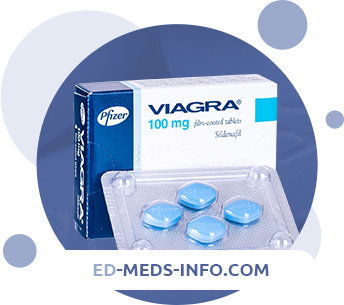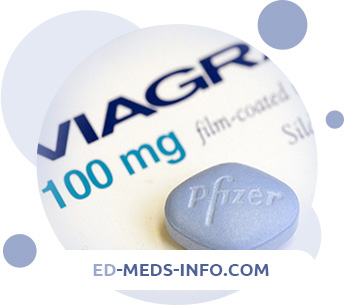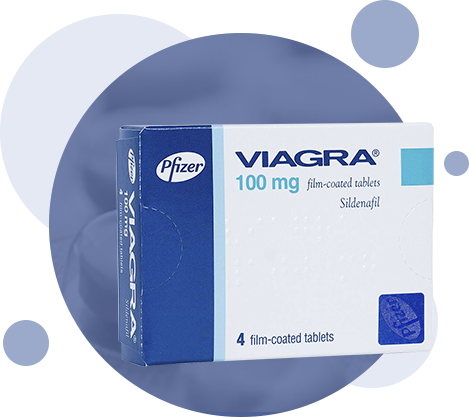
How does Viagra and other sildenafil drugs work?
For an erection to occur, the nerves in the penis need stimulation, which becomes a kind of signal to relax the muscles of the corpus cavernosum and fill the penis with blood. However, with erectile dysfunction, communication between the brain and nerves deteriorates, and as a result, at the “crucial moment”, blood does not enter the corpus cavernosum.
And this is where sildenafil (Viagra or a drug under another name) comes into play. It relaxes the walls of the blood vessels and makes it easier for blood to travel to the parts of the penis that cause an erection.
Viagra acts exclusively on the natural mechanisms of erection, but not on sexual desire. Therefore, if it was not originally there, it may simply not work.
By the way, if you mix Viagra with alcohol, then the effect of the drug can also come to naught. The fact is that alcohol reduces blood flow to the penis, thereby making sildenafil less effective.

Description of the Drug
Viagra is a drug used to treat erectile dysfunction (impotence) in men. Viagra helps most men with impaired erectile function to achieve an erection and keep it when sexually aroused. You will not get an erection if you just take this drug.
The drug was synthesized in the search for a means to improve blood flow in the myocardium, treat angina pectoris and coronary heart disease. During clinical trials in 1992, it was revealed that its effect on cardiac blood flow is minimal, but it has a pronounced effect on blood flow in the pelvic area, including improving blood flow in the penis.
The drug increases the amount of blood flowing into the penis, which enhances natural erection. Sildenafil works only when the man is naturally sexually aroused, and when intercourse is over, the penis naturally returns to a relaxed state. In other words, sildenafil acts only on the natural mechanisms of an erection.
Sexual stimulation is a prerequisite for the effectiveness of sildenafil. Sildenafil restores impaired erectile function under conditions of sexual stimulation by increasing blood flow to the corpora cavernosa of the penis.
Sildenafil is available in 25, 50 and 100 mg tablets, which contain 25, 50 and 100 mg of sildenafil citrate, respectively. Generic drugs may contain increased dosages of up to 150 mg.
Contraindications to the use of Viagra
- severe hepatic impairment (Child-Pugh class C);
- severe cardiovascular diseases (severe heart failure, unstable angina pectoris, stroke or myocardial infarction within the last 6 months, life-threatening arrhythmias, arterial hypertension (BP> 170/100 mm Hg) or hypotension (BP <90/50 mmHg.));
- episodes of development of non-arteritis anterior ischemic neuropathy of the optic nerve with loss of vision in one eye;
- hereditary retinitis pigmentosa;
- use in patients receiving permanently or intermittently donors of nitric oxide, organic nitrates or nitrites in any form, since sildenafil enhances the hypotensive effect of nitrates;
- the combined use of PDE5 inhibitors, including sildenafil, with guanylate cyclase stimulants such as riociguat, because this can lead to symptomatic hypotension;
- simultaneous use of the drug with other drugs for the treatment of erectile dysfunction (the safety and effectiveness of combination therapy has not been studied);
- concomitant use of ritonavir;
- lactose intolerance, lactase deficiency, glucose-galactose malabsorption;
- children and adolescents up to 18 years old;
- use in women;
- hypersensitivity to sildenafil or to any other component of the drug.
With care: anatomical deformity of the penis (angulation, cavernous fibrosis, or Peyronie's disease); diseases that predispose to the development of priapism (sickle cell anemia, multiple myeloma, leukemia, thrombocythemia); bleeding diseases; peptic ulcer of the stomach and duodenum in the acute stage; liver dysfunction; severe renal failure (Cl creatinine <30 ml / min); patients with a history of anterior non-arteritic ischemic neuropathy of the optic nerve; simultaneous reception of blockers of α-adrenergic receptors.
Elderly age. In healthy elderly patients (over 65 years old), the clearance of sildenafil is reduced, and the concentration of free sildenafil in the blood plasma is approximately 40% higher than in young people (18–45 years old). Age does not have a clinically significant effect on the incidence of side effects.
Renal dysfunction. With mild to moderate renal failure, the pharmacokinetics of sildenafil after a single oral dose of 50 mg does not change. In severe renal failure, the clearance of sildenafil decreases, which leads to an approximately twofold increase in the AUC (100%) and Cmax (88%) values compared with those with normal renal function in patients of the same age group.
Liver dysfunction. In patients with cirrhosis of the liver (classes A and B according to the Child-Pugh classification), the clearance of sildenafil decreases, which leads to an increase in the AUC (84%) and Cmax (47%) values compared with those with normal liver function in patients of the same age. groups. The pharmacokinetics of sildenafil in patients with severely impaired liver function (class C according to Child-Pugh classification) has not been studied.
Dosage
The drug is taken orally. Oral dispersible tablets may be taken with or without water. You should put the tablet on your tongue, after which it dissolves quickly and can be swallowed. The tablet should be taken immediately after opening the blister. For patients on whom a 100 mg dose of sildenafil is recommended, the second 50 mg sildenafil tablet should be taken after the first 50 mg sildenafil tablet is completely dissolved.
It should be borne in mind that the absorption of sildenafil is significantly slowed down when used in combination with fatty foods.
For most patients, the recommended dose is 50 mg approximately 1 hour before sexual activity. Taking into account the effectiveness and tolerance, the dose can be increased to 100 mg or reduced to 25 mg (only film-coated tablets of the appropriate dosage should be taken).
The maximum recommended dose is 100 mg. The maximum recommended frequency of use is 1 time / day. Patients for whom a 100 mg dose of sildenafil is recommended should take two tablets, dispersed in the oral cavity at a dosage of 50 mg, one after the other.
In case of mild to moderate renal failure (CC 30-80 ml / min), dose adjustment is not required; in severe renal failure (CC <30 ml / min), the dose of sildenafil should be reduced to 25 mg.
Since the elimination of sildenafil is impaired in patients with liver damage (for example, with cirrhosis), the dose of the drug should be reduced to 25 mg.
In elderly patients, dose adjustment is not required.

Overdose
With a single dose of Viagra in a dose of up to 800 mg, adverse events were comparable to those when taking the drug in lower doses, but they were more common.
The use of the drug in a dose of 200 mg did not lead to an increase in the effectiveness of the drug, however, the frequency of adverse reactions (headache, "hot flashes", dizziness, dyspepsia, nasal congestion, visual impairment) increased.
Treatment: symptomatic therapy. Hemodialysis does not accelerate sildenafil clearance, because the latter actively binds to plasma proteins and is not excreted in the urine.
In case of overdose, consult a doctor immediately.
Side Effects
Like all medicines, this drug can cause side effects, although not everybody gets them. Typically, side effects when taking sildenafil are mild to moderate and transient.
If you develop any of the following serious side effects, stop taking Viagra and seek medical attention immediately:
- Allergic reaction
- Chest pain
- Long and sometimes painful erections
- A sharp decrease or loss of vision
- Serious skin reactions
- Convulsions or seizures
Other side effects
Very common: headache
Frequent: facial flushing, indigestion, visual disturbances (including color blindness, sensitivity to light, blurry vision or decreased visual acuity), nasal congestion, and dizziness.
Uncommon: vomiting, skin rash, hemorrhage in the back of the eye, eye irritation, eye flushing / redness, eye pain, double vision, unusual sensation in the eyes, watery eyes, palpitations, palpitations, muscle pain, drowsiness, decreased tactile perception, dizziness, ringing in the ears, nausea, dry mouth, bleeding from the penis, blood in semen and / or urine, chest pain and feeling tired.
Rare: high blood pressure, low blood pressure, fainting, stroke, heart attack, arrhythmia, nosebleeds, and sudden hearing loss or loss.
Interaction with other medicinal products
Certain medications can change how Viagra works. Tell your doctor about any medications you are taking. Do not start or stop taking any medication without consulting your doctor or pharmacist. This applies to both prescription and over-the-counter drugs.
Viagra can affect some medications, especially the drugs used to treat chest pain. If a medical emergency develops, you should inform your doctor, pharmacist or nurse that you took Viagra and when you did it. Do not take Viagra with other medicinal products, unless your doctor permits you to do so.
Viagra should never be taken together with preparations containing nitrates.
If you are taking an alpha-blocker drug for hypertension (high blood pressure) or prostate problems, your blood pressure can drop dramatically. You may feel faint or dizzy.
If you are taking protease inhibitors, CYP3A4 isoenzyme inhibitors (eg erythromycin, ketoconazole, itraconazole), you may need to adjust the dose.
Viagra should not be used in conjunction with any other drugs that induce an erection. These are pills or injections; medicines that are injected into the penis; implants or vacuum pumps.
Precautions
Only a doctor can decide for sure whether Viagra is a necessary drug for you. Viagra can cause a slight temporary decrease in blood pressure, so you may need to undergo a medical examination to establish a diagnosis of erectile dysfunction, and to find out that you can take Viagra without risk to your health, including with other medications prescribed to you. Your doctor must determine if your heart can handle the stress of having sex.
Be sure to tell your doctor
- if you have ever had any heart problems (for example, angina (chest pain), heart failure, heart rhythm disturbances, myocardial infarction, or stenosis (narrowing) of the aorta;
- if you have had a stroke;
- if you have had low or high blood pressure;
- if you have ever had severe vision loss;
- if you have a rare congenital eye disease - retinitis pigmentosa;
- if you have had kidney problems;
- if you have had liver problems;
- if you have had a history of blood disorders, including sickle cell disease or leukemia;
- if you are allergic to sildenafil or any other ingredient in Viagra tablets;
- if you have a penis deformity (Peyronie's disease), or have ever had an erection lasting more than 4 hours;
- if you have had ulcerative bleeding or any other bleeding;
- if you are taking any other medications.
 DE
DE FR
FR IT
IT ES
ES








